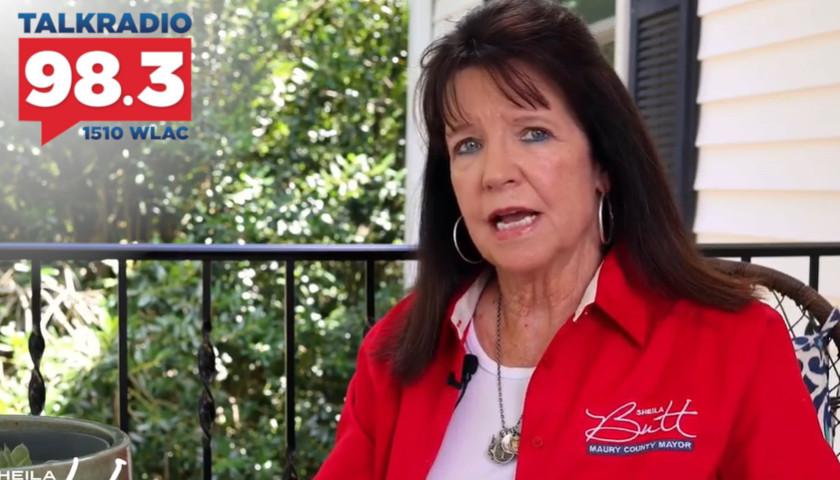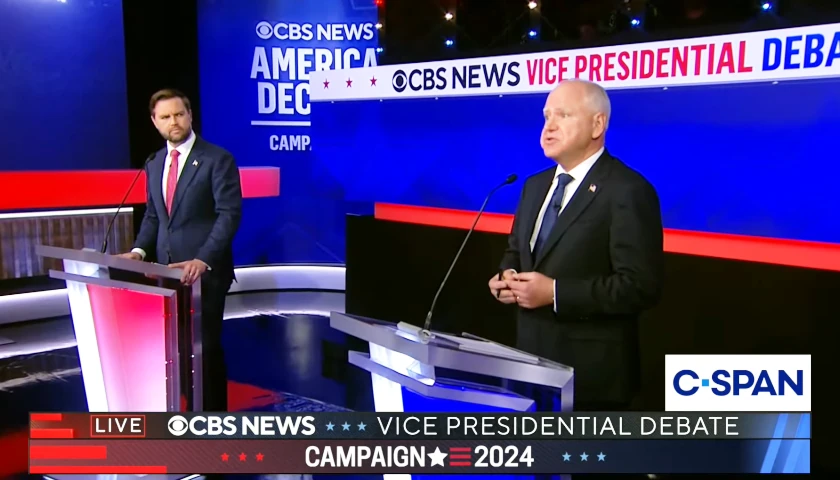Live from Music Row, Wednesday morning on The Tennessee Star Report with Michael Patrick Leahy – broadcast on Nashville’s Talk Radio 98.3 and 1510 WLAC weekdays from 5:00 a.m. to 8:00 a.m. – host Leahy welcomed Maury County Mayor Sheila Butt in studio to talk about how she and her fellow mayors are coming together to work with the General Assembly to bring fiscal fairness to county governments in Tennessee.
Leahy: We are having too much fun here in the studio with the mayor of Maury County, Sheila Butt. You know, Sheila, it is just such a delight to have you in here, because we’ve known each other a long time.
Butt: I remember the first time I ever sat next to you at some dinner. I don’t know. We were at another convention somewhere is the first time we ever met. Probably 15, 16 years ago.
Leahy: About 15, 16 years ago. Yes. This was during the Tea Party days.
Butt: Absolutely.
Leahy: When we were out focusing on free markets and fiscal responsibility and constitutionally limited government.
Butt: Yes. Remember that?
Leahy: Remember those days?
Butt: Let’s go back to that.
Leahy: Let’s actually preserve the Constitutional Republic of America.
Butt: Amen to that.
Leahy: A Republic if you can keep it, and we’re right there in the middle of it. As mayor of Maury County, though, you are able to really focus on Maury County and Tennessee. There is a problem right now that county mayors are facing.
Butt: Yes.
Leahy: And you and our friend Joe Carr and other mayors have a solution for that problem. Tell us about the solution, the bill that’s pending, and where it stands.
Butt: Let me start with the problem. The problem is, as counties and cities are growing, cities have the ability to have new development, and pay for mandated services. When I say mandated services, I know you said I made a face when I said that word because I’ll always make a face when I say mandated services.
The county of Maury County is mandated to have schools and a great education for every child that comes into Maury County. As I told you, we have three cities that have no investment in the schools or the education of those children. All of that investment falls on the county and the County Commission to pay for.
So here we are with all these new people coming into all three municipalities who have no input and help with education for the county. We had a meeting the other night with the ambulance service. Now, we’re required by TCA law to educate those children. The county is required to do that. We had a meeting the other night.
Our ambulance service came in and said we’ve been giving them $600,000 a year. They need $3.2 million a year. Now, with the influx of people in Maury County, do you know who pays for that? The county pays for that. The cities don’t pay for that.
So you have all this new development, thousands of new people moving into the county, and most of those mandated services fall on the county to pay for. Now, the cities have something that was granted to them in 2006 called an impact fee.
And just a few weeks ago in the city of Columbia, they put an impact fee on water taps for sewage for $4,500. They are allowed to do that by statute. The County Powers Act that was written in 2006 said that cities are allowed to make people coming into the county invest in those services, but that counties do not have the power to do that. It’s totally unfair. And I understand that when Jimmy Naifeh was the Speaker, that’s when all this came about.
Leahy: Just for a moment, let’s just talk about Jimmy Naifeh. If you ever saw one of those old movies with Boss Tweed or the old political boss with the cigar hanging out and making backroom deals and telling people what to do, that was Speaker Jimmy Naifeh, a Democrat. This guy had power and knew how to wield it. And you didn’t cross him.
Butt: Interestingly his county was left out of this. His county Tipton, I believe was given the authority to do that, but it was the only county. (Leahy laughs) And then Williamson County has fought it over the years, and they have been able to do it.
But we’re just going to the legislature saying that the counties need the same tools in their toolbox that the cities have when it comes to growth and development and the mandated services that those people need.
So the people coming into the community should be investing in that. Community property owners are already paying for the services that they need. We are paying for that with our property taxes. And, okay, we’re glad to do that. But to say that we have to pay for all of the new people coming in and all the services that they’ll need is just not fair.
Before I came into office, Maury County just had a $0.31 tax increase, and that’s just the beginning of what will have to happen if new investments coming into the community do not have to help with that. This is a bill that county mayors across the state are going to be working with. I did go in and talk to Speaker Sexton yesterday. I served with him for three years.
Leahy: You know Speaker Sexton?
Butt: Oh, very well, yeah.
Leahy: You worked with him on many committees.
Butt: Yes, he sat right in front of me on the floor for four years. I feel like Cameron and I are pretty good friends, and I went in and talked to him yesterday, and he very much understands this, and he understands that this needs to happen. I was glad to hear that from him. He certainly will help us with this I believe.
I certainly know he won’t oppose it, but he said he totally understands, and I’m sure Cameron will help us with this. Governor Lee, I think he’s on board as well to help with this. So I think if ever this is going to happen for counties to be treated as fair as the cities, it will happen this time.
Leahy: Of course, state Senate Majority Leader Jack Johnson, a friend of this program, been a guest host of this program as well, have you had a chance to talk with your friends in the state Senate about this?
Butt: Of course we have. Joey Hensley as our state senator.
Leahy: And Joey Hensley, by the way, state Senator Hensley also represents me because he’s got a little tiny sliver of Williamson County. And I live in that sliver.
Butt: Interesting. Joey and I have become very close friends as well over the years. And Joey actually got a local bill passed for this through the Senate last year, but we did not get it through the House. Cameron mentioned yesterday, he said, Sheila, you better go to the Senate.
And so I’ll be working with Jack and going to the Senate as well, and I’m sure Joey will as well. We have a mayor’s conference meeting on the 27th of this month. We will certainly be bringing this forth to all the mayors who will be making their voices heard.
Leahy: I think all of them would support this bill.
Butt: I think so, yes. I think we’ll mobilize every county.
Listen to today’s show highlights, including this interview:
– – –
Tune in weekdays from 5:00 – 8:00 a.m. to The Tennessee Star Report with Michael Patrick Leahy on Talk Radio 98.3 FM WLAC 1510. Listen online at iHeart Radio.
Image “Mayor Sheila Butt” by Shelia Butt.






Impact Fee, User Fee, Service Fee. Property Tax, Gas Tax, Hotel/Motel Tax. the list goes on and on. We don’t have a revenue problem, we have a spending problem. A more narrowly defined function of government and a reduction of taxes and fees gives the public the opportunity to actually determine what is truly a priority. Pointing out someone else has something you don’t is not good public policy.